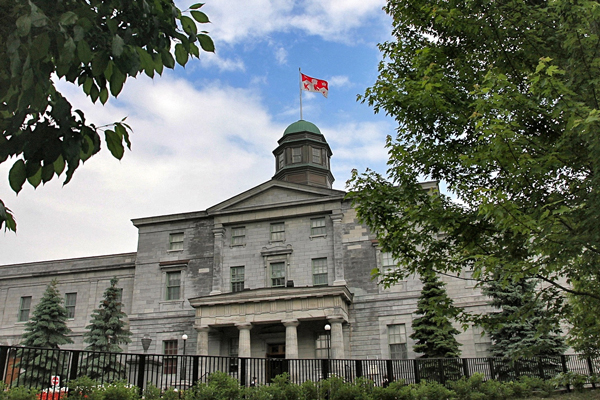
By Meaghan Thurston
McGill will receive over $25 million from the Natural Sciences and Engineering Research Council (NSERC) for studies ranging from the genomics of adaptation to environmental change, to defusing volcanic eruptions, to studies on robotic teamwork and collaboration.
Ed Holder, Minister of State (Science and Technology), announced on June 26 the 2014 competition results for the NSERC Discovery Grants, Supplements, and Scholarships. Through these grants, over 140 McGill research projects will receive significant financial support for discovery research and training for a period of one to five years.
Across Canada, the government will invest $340 million to support 3,796 research projects and McGill ranked among the top five institutions in terms of total investments made.
“The quality of our researchers and their dedication to pushing forward creative, innovative ideas are evidenced once again by the number of projects receiving NSERC support in this round,” said Dr. Rosie Goldstein, Vice-Principal (Research and International Relations). “Federal investments in our University’s fundamental research and in the scientists, engineers, post-doctoral fellows, and students undertaking the projects allow us to address some of the most important challenges affecting the future of our world.”
Headed by some of the University’s most senior researchers, as well as new faculty members, the success rate for applications made by established McGill researchers renewing their grants was in the 80th percentile. Discovery Grants are NSERC’s leading source of funding for thousands of researchers each year. These grants account for more than one-third of NSERC’s total annual budget of $1.1 billion and are the single largest area of investment.
Prof. Isabelle Roullier, of the Department of Anatomy and Cell Biology, and a recipient of an Individual Discovery Grant, pointed to the wide-reaching benefits of the funding, not only for the research projects, but for the training of new generations of researchers. “The NSERC funding is essential for the continuation of my labs’ research on the protein complex involved in the trafficking of the cell, a fundamental process for life in general,” she said. “We are so grateful to have obtained the funding, which benefits the entire lab and its researchers, who will gain important training with this NSERC grant.”
Prof. David Plant, also a recipient of an Individual Discovery Grant for his research devoted to solving complex communication problems, including the applications of large broadband communications research, emphasized the impact the funding has on the ability of researchers to think-big and innovate. “My McGill co-applicants and I are thrilled to receive funding from NSERC to support our research on photonic devices and technologies,” he said. “One needs only to look as far as the photonically enabled Internet to understand the importance of this technology, and NSERC’s investment will enable us to develop future generations of the technology.”
Nine McGill researchers were selected for supplemental funding (valued at $120,000 over three years) in addition to a Discovery Grant. These additional resources are intended to accelerate progress and maximize the impact of these outstanding research programs. The successful researchers include:
Professor Terence Corderre, Anesthesia Research Unit: Role of protein kinase M zeta in spinal nociceptive sensitization
Professor Gonzalo Cosa, Department of Chemistry: Chemical and biological processes studied with advanced imaging techniques
Professor Matt Dobbs, Department of Physics: Exploring the origin and fate of the universe with millimeter-wave and radio instrumentation and observations
Professor Andrew Gonzalez, Department of Biology: Integrative biodiversity science for global change
Professor Andrew Higgins, Department of Mechanical Engineering: Dynamics of Energetic Events in Condensed Phase Media
Professor Stan Kubow, School of Dietetics and Human Nutrition: Investigation of the protective effects of polyphenols on polychlorinated biphenyl-induced inflammation and oxidative stress: impact of biotransformation
Professor Denis Mitchell, Department of Civil Engineering: Seismic Design and Evaluation of Concrete Bridges and Buildings
Professor Piotr Przytycki: Hyperbolicity and dismantlability
Professor John Stix, Department of Earth and Planetary Sciences: Transport of magma and gas from the mantle to the atmosphere by volcanic eruptions
More information about the Discovery Grant Program is available on the NSERC website.
